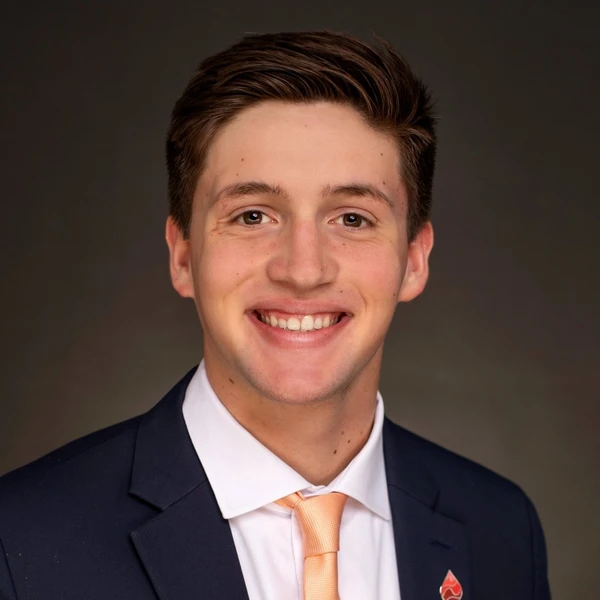
Hobbies and interests
Advocacy And Activism
Architecture
Basketball
Community Service And Volunteering
Public Speaking
Jackson McGillen
465
Bold Points1x
Finalist1x
Winner
Jackson McGillen
465
Bold Points1x
Finalist1x
WinnerBio
My name is Jackson McGillen, and I was diagnosed with Type 1 Diabetes on March 14, 2018. Since then, I have learned how to fully embrace opportunities. I graduated from Riverfield Country Day School in May of 2025 and am now attending Oklahoma State University with a major in Architecture. I switched schools my junior year of high school, and when switching, I decided to be authentic and find friends who liked me for me. I joined the high school basketball team, which was especially difficult for me since I had not played basketball since the sixth grade. I am very active in a nonprofit organization called Breakthrough T1D. Breakthrough T1D's mission is to raise awareness of Type 1 diabetes and ultimately find a cure. Through Breakthrough T1D, I have gotten the opportunity to be involved with the legislative process. I was the sole youth speaker at the first Oklahoma Diabetes Advocacy Day, paged for an Oklahoma Senator, and was the keynote speaker for a Diabetes Caucus meeting. I am a hard-working, authentic person who fully leans into new and uncomfortable situations.
Education
Oklahoma State University-Main Campus
Bachelor's degree programMajors:
- Architecture and Related Services, Other
Miscellaneous
Desired degree level:
Master's degree program
Graduate schools of interest:
Transfer schools of interest:
Majors of interest:
Career
Dream career field:
Architecture & Planning
Dream career goals:
Server, cashier
Simply Sweet2023 – 2023
Sports
Soccer
Varsity2024 – 20251 year
Basketball
Varsity2023 – 20252 years
Public services
Advocacy
Breakthrough T1D — Junior Spokesperson, advocate, youth ambassador2022 – Present
Sloane Stephens Doc & Glo Scholarship
I remember being lifted off the soccer field, feeling weightless, where I couldn’t open my eyes without being blinded, where I felt like the world was spinning, where I felt like falling asleep forever. Soon after, I was told life-altering news: I had Type 1 Diabetes (T1D). This was a lot to process as a ten-year-old, especially since I had no idea what diabetes was or what it entailed, only that my life was forever changed. While I was at the endocrinologists’ office, I saw a banner for Camp Blue Hawk, a camp for kids diagnosed with T1D. At first, I didn’t want to go because I didn’t want to be reminded that I had an incurable illness. But my family encouraged me to go.
When attending Camp Blue Hawk, I learned that some of the counselors had Type 1 Diabetes and others were medical students. The strange part was, I had no idea which counselors had diabetes because they all seemed so normal. After that week of summer camp, my perspective on diabetes completely changed. Before, I focused on how different my life was compared to everyone else. Now, I realize that you can live a normal life if you learn to embrace diabetes. And with the help of Breakthrough T1D, I help other kids learn how to thrive and live a “normal” life.
I became involved with Breakthrough T1D, a nonprofit focused on improving the lives of those living with diabetes, while funding research, and ultimately, a cure. One of my favorite things to do within Breakthrough T1D is to work with newly diagnosed kids and their families. One family in particular left an impact on me. I met with a newly diagnosed Ukrainian boy, whose dad was having a hard time adjusting and trusting himself to safely take care of his child. As we interacted over dinner, I shared how I learned to cope with diabetes, showing that your diagnosis doesn’t define who you are, a “normal” life is still possible, and that you don’t have to be perfect in your management of diabetes. After meeting with the family, I was told multiple times by the father that I made a lasting and impactful impression on him and his family. Our families have kept in touch, and other than learning how to navigate the troubles of insurance and accessibility of life-impacting technology, they are flourishing.
After learning how to use my voice to inspire others, I became involved in advocacy efforts. Living with diabetes, I am concerned about the high costs for my life-saving insulin, pump, and technologies. I worked with Breakthrough T1D and Senators on how to increase accessibility. I was invited to speak at the Oklahoma Diabetes Caucus meeting, a group of legislators focused on diabetes prevention, treatment, and research. I was extremely nervous as the keynote speaker, but I pushed through knowing my voice could make a difference. My story highlighted the importance of making available therapies like the artificial pancreas to all, and not just individuals with great insurance. I was also selected to represent Oklahoma at the Children’s Congress in Washington, D.C., where I met with Congress to advocate for funding of the Special Diabetes Program.
Looking back, I’ve come to realize that, in many ways, I’m grateful for having diabetes. I am grateful for having diabetes because I get to live my life the way I want, where I discovered my passion for public speaking and service, where I inspire kids and families about living a “normal” life, and where I know I have used my voice for change.